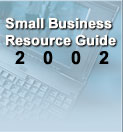Starting Your Business/Keeping Tax Records
Accounting Periods and Methods
Changes in Accounting Method
Change
in Accounting Method. You can generally choose any permitted
accounting method when you file your first tax return. You do
not need IRS approval to choose the method. It must be used consistently
from year to year and clearly show your income. See Accounting
Methods.
A change in your accounting method includes
a change not only in your overall system of accounting but
also in the treatment of any material item. Although an
accounting method can exist without treating an item the
same all the time, an accounting method is not established
for an item, in most cases, unless the item is treated the
same every time.
Changing Your Business' Method Of Accounting
Automatic Consent. You may be
able to change your business' method of accounting with
the IRS's automatic consent and receive the benefits of
a voluntary change in method of accounting. If your business
qualifies for automatic consent, you make the change without
paying any user fee and without waiting for a letter ruling.
Rev.
Proc. 99-49, IRB 1999-52, describes 41 types of changes in
method of accounting that you can make for your business with
the IRS's automatic consent, if your business qualifies. For
example, if you are currently using the cash receipts and
disbursements (cash) method of accounting for your business you
may be able to change to the accrual method using the automatic
consent procedures in Rev. Proc. 99-49, even if the cash method
is not a proper method for your business. The other 40 types of
changes are described in the Appendix of Rev. Proc. 99-49.
Additional types of changes in method of accounting that you
may be able to make for your business with the IRS's automatic
consent are described in Rev.
Proc. 98-58, 1998-49 I.R.B. 19; Rev.
Proc. 97-43, 1997-2 C.B. 494; Rev.
Proc. 92-67, 1992-2 C.B. 429; Rev.
Proc. 92-29, 1992-1 C.B. 748; and Rev.
Proc. 91- 51, 1991-2 C.B. 779.
Non-Automatic Consent. If you want to change your business'
method of accounting, but cannot use one of the IRS's automatic
consent revenue procedures, you may be eligible to request the
change under the non-automatic provisions of Rev.
Proc. 97-27, 1997-1 C.B. 680. You must file your request under
Rev. Proc. 97-27 during the tax year you want to change to the
new method. Also, you must pay a user fee with your request under
Rev. Proc. 97- 27. The user fee for requests filed under Rev.
Proc. 97-27 currently is $500 for business related tax issues
for business' with gross income of less than $1 million, and,
generally, $1,200 otherwise. When your request is approved, you
will receive a letter ruling containing the IRS's consent for
your change. You must have this letter to use the new method of
accounting on your return.
IRS Form. Ordinarily, you will need to file Form
3115, Application for Change in Accounting Method, to change
your business' method of accounting under an automatic consent
revenue procedure or to request a change under the non-automatic
provisions of Rev. Proc. 97-27.
Benefits. When you voluntarily
change your business' method of accounting from one that
is improper to one that is proper under either the automatic
or the non-automatic consent procedures, you generally receive
the following benefits for your business:
- a current year of change to the proper
method (no amended returns for prior years);
- no interest or otherwise applicable
penalty for the benefits your business received from the
past use of that improper method;
- a four year spread of any adjustment
required under section 481(a) of the Code (to convert
your old method to the new proper method); and
- protection from the IRS requiring
your business to change from that improper method for
an earlier period.
Important: Due to the complex
nature of applying for a change in accounting method, you
may want to seek the advice of a professional before applying
for a change.
IRS
Approval for Change in Accounting Method
Important References:
Publication
538 Accounting Periods and Methods
Form
3115
Application for Change in Accounting Method
